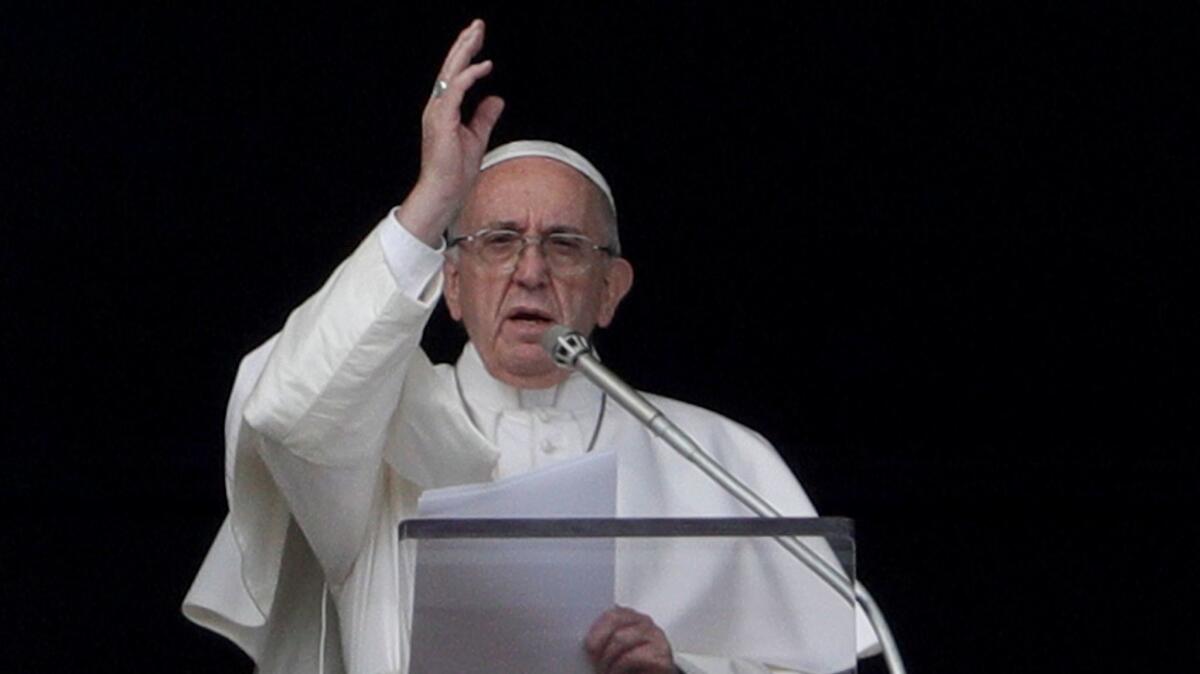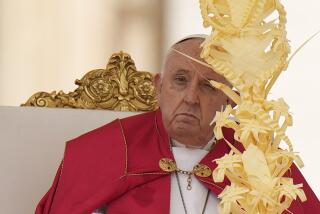Pope Francis suggests rewording the Lord’s Prayer. The problem? ‘Lead us not into temptation’

Reporting from ROME — Pope Francis has called for a rewriting of the Lord’s Prayer, saying the current translation gives God a bad name and, essentially, does not give the devil his due.
Described in the Bible as a prayer taught by Jesus, the Lord’s Prayer is viewed in the catechism of the Roman Catholic Church as “the summary of the whole gospel.”
Used by Catholics, Protestants and Orthodox Christians, the prayer is common ground for churches, which have historically fought over theology, and it can be recited by heart by millions around the world.
But in a TV interview this week, Pope Francis said that the line asking God to “Lead us not into temptation,” or in Italian, “non indurci in tentazione,” should be changed because it has been translated badly.
“It’s not a good translation,” he told TV2000, a channel belonging to Italy’s conference of bishops, because it implies God actively pushes people into temptation.
“I am the one who falls,” Francis said. “It’s not Him pushing me into temptation to then see how I have fallen. A father doesn’t do that; a father helps you to get up immediately,” he added.
“It’s Satan who leads us into temptation — that’s his department,” he said.
It’s Satan who leads us into temptation — that’s his department
— Pope Francis
The interview gave a stamp of papal approval to moves already afoot in the church to change the line in the prayer.
Last month, the Catholic Church in France agreed to switch from the French equivalent of “Do not submit us to temptation” to “Do not let us enter into temptation.” The pope said he was impressed with the new wording.
The Lord’s Prayer, also commonly called the Our Father, appears in two gospels: Matthew 6: 9-13 and Luke 11: 2-4.
Down the centuries, the short prayer has been through the wringer, linguistically speaking, after being translated from Aramaic — the language Jesus spoke — to Greek and to Latin and to other languages.
The problem stems from the translation of one Greek word, “eisenènkes,” said Massimo Grilli, a professor of New Testament studies at Gregorian University in Rome.
“The Greek verb ‘eisfèro’ means ‘take inside,’ and the form used in the prayer, ‘eisenènkes,’ literally means ‘don’t take us inside,’ ” he added.
“But that’s a very literal translation, which must be interpreted,” Grilli said.
A 4th century Latin translation of the Bible by St. Jerome, which was adopted by the Catholic Church, sticks to the literal meaning, using the Latin “inducere,” which means “bring in.”
“Despite what some headline writers might suggest, Francis is not suggesting changing Jesus’ words, but just giving a better translation from the original Greek,” said the Rev. James Martin, a Jesuit priest and editor at large of America, a Jesuit magazine.
“Before we criticize the pope for inserting his own opinion into traditional prayer, we should recall that St. John Paul added an entire new series of mysteries to the rosary,” he added.

Grilli said the line “Lead us not into temptation” in the Lord’s Prayer was already being reevaluated throughout the Catholic Church.
“The Spanish have already switched to ‘Don’t let us fall into temptation,’ ” he said.
In 2008, the Italian bishop’s conference switched to “Don’t abandon us to temptation,” although many priests have stuck with the old version during their services.
Francis’ emphasis on the role of the devil leading believers toward temptation reflects his firm belief that Satan exists, after years in which the church played down the idea of the devil as a person.
Adjusting the translation of the prayer may appear groundbreaking, but pales in comparison to the tinkering that has happened in the past. Today the King James version of the prayer ends:
And lead us not into temptation,
but deliver us from evil:
For thine is the kingdom, and the
power, and the glory, forever.
But scholars say the last two lines were added by scribes. The reason? They felt that wrapping up the prayer with talk of evil was too abrupt, and it needed a more polished ending.
Kington is a special correspondent.
ALSO
In a rare court challenge to its abortion ban, Brazil grapples with its own version of Roe vs. Wade
What will U.S. foreign aid look like in the age of Trump?
A sacred Japanese island juggles secrecy and survival
More to Read
Sign up for Essential California
The most important California stories and recommendations in your inbox every morning.
You may occasionally receive promotional content from the Los Angeles Times.










